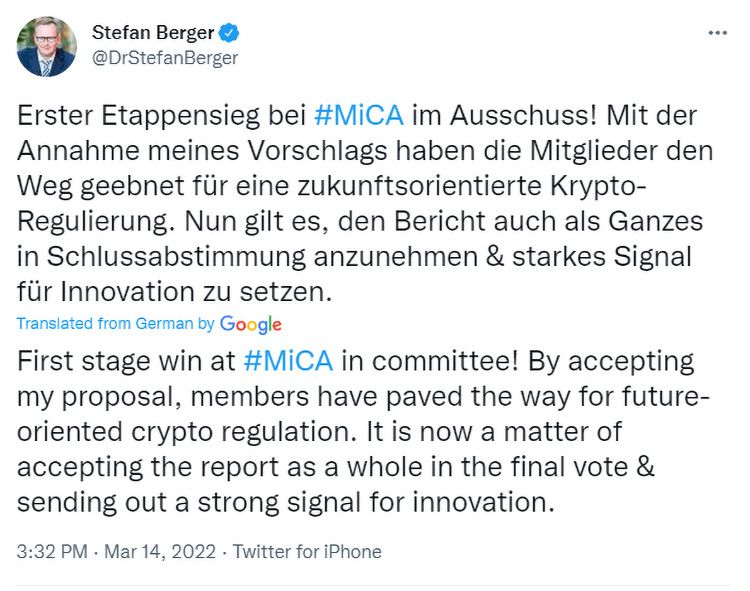Bitcoin, the best known cryptocurrency, has come under fire numerous times from many national governments and their agencies since its creation in 2008. Many have called for bans on the use of Bitcoin and other cryptocurrencies, whilst others moved to formulate regulatory measures and standings around cryptocurrencies, their use and promotion. Some countries have also cited the effects Bitcoin mining may have on the environment.
Some member states of the European Union have raised concerns around Bitcoin mining especially, in a move to completely ban the mining of POW cryptocurrencies across Europe. That move is what we’ll be exploring today.
What Is MiCA?
Standing for Markets in Crypto-assets, the MiCA legislation was agreed upon by the neighboring countries and brought into legislation by the EU on 24th September 2020. Amendments for the legislation, like any other must be voted on in the European Parliament.

In November 2021, a presentation was published by members of the Swiss Financial Supervisory Authority and the Swiss Environmental Protection Agency, calling for an EU wide ban on Proof-Of-Work mining for cryptocurrencies. The FI-published article, submitted as an amendment to the EU’s MiCA legislation, mentioned Bitcoin and Ethereum specifically, but also pointed at other cryptocurrencies using the same method. It may be also interesting to note that Bitcoin mining was never included or even mentioned in the original legislation.
The Effects of POW Mining
Bitcoins are created using a process to solve cryptographic equations, known as mining, using an algorithm called Proof-Of-Work (POW). There are many other cryptocurrencies, including the popular Ethereum, which employ a Proof-Of-Work algorithm to secure and process transactions of their networks.
No one will argue that POW mining is an energy intensive task, especially when being performed by millions of high power specialist mining machines around the globe. These specialist devices are called ASIC miners. Anyone with a computer, or an ASIC miner can mine Bitcoin, but it takes a lot of energy to do so. The exact amount is constantly being researched and monitored by a number of institutions around the world. However, as crypto mining is still very nascent in terms of industry, It’s hard to tell exactly just how much of an impact things will have in time to come.
Ethereum is heavily mined using computer Graphics Processing Units, it’s common to see multiple GPU’s “daisy-chained” together to create cryptocurrency ‘mining rigs’. The acquisition of NVIDIA GPU’s by crypto miners has drawn criticism from a mixed crowd over the years, notably among the PC gaming community with everything from being the cause of PC parts shortages to NVIDIA themselves attempting to stem the buying and use of their GPU’s for crypto mining.
In recent years the Ethereum Foundation and Ethereum community has taken a number of steps in a journey to transition their blockchain to a Proof-Of-Stake (POS) algorithm, which is an alternative to POW mining.
One concern raised by environmentalists over the use of Bitcoin mining, is the question of the power used by Bitcoin mining farms. This has led to multiple research studies, media FUD, political concern and even protests against the sustainability of POW mining. In turn, this has led many governments around the world to heavily scrutinizing, regulating, and in some instances banning, POW mining altogether.
Although the effects of POW mining are arguable, many crypto companies have already begun to look at other more sustainable sources of energy and energy refinement. Both industrial and smaller mining farms have employed the use of solar energy among other means, such as repurposing the heat output from mining operations to do things such as heat greenhouses for local vegetable farms, as reported by PR Newswire.
The Vote
On 7th March 2022, a draft proposal was submitted to address POW mining, just prior to the date of the Committee on Economic & Monetary Affairs (ECON) meeting of 14th March 2022.
News of the proposal quickly spread across social, traditional media websites and throughout the crypto community. The usual cautionary headlines and FUD ensued, with many wondering about the effects that a POW mining ban could have on Bitcoin and the crypto community. By the time the date came people were sharing links to the EU Parliament live stream on Twitter, although there was no actual streaming of the vote itself.
The conclusion of the vote was first posted on Twitter, by member of EU Parliament Dr. Stefan Berger, which was promptly picked up and circulated around the crypto community. The vote was in, and the bill was… rejected. Crypto enthusiasts and investors took to Twitter to celebrate the news, although many leading crypto analysts and researchers continue to debate what is next as a result of the votes’ conclusion.
You can find the committee’s results on the vote via the official announcement published on the EU Parliament website.

What’s Next for Proof-of-Work Mining?
Although, this is a clear win here for the crypto community, POW mining has been added to the EU’s “Taxonomy for sustainable activities by 2025 to reduce carbon footprint” a move welcomed by Bitcoiners worldwide.
As mentioned, the Bitcoin mining industry has taken many steps over the years to reduce the effect that Bitcoin mining has on the environment, using other forms of power generation and renewable sources, which has led to a major reduction in the consumption energy used by industrial mining operators. The environmental cost associated with ASIC production is also being reduced as new chips are being innovated and manufactured.
There are many studies, articles, and reports on the environmental impact of Bitcoin mining around the web, however, there needs to be much more research and time before anything can be said about the reduction of any negative effects over time.
So, is Bitcoin mining bad for the environment? Is it so bad that POW mining should be banned? Will repurposing end up saving/generating more energy in the future? The crypto industry is moving fast, with new innovations developed regularly. Time will tell if POW mining should be banned.
Read Next
About The Author




